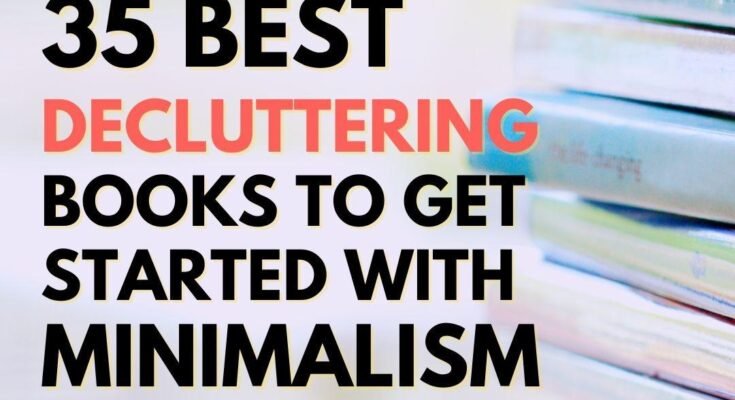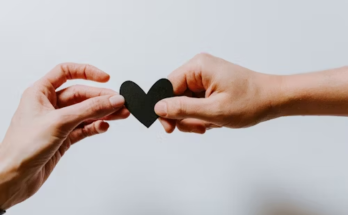
This minimalist bookshelf is perfect for showcasing your books in a modern manner. Wall-mounted for ease of access, it features beautiful teak wood with an eye-catching finish.
Thatcher Wine of Juniper Custom in Boulder suggests diversifying your sources for books to achieve an organic appearance on your shelves and prevent them from looking staged or curated.
Marie Kondo’s “The Life-Changing Magic of Tidying Up”
Decluttering is more than a physical task; it’s an invaluable opportunity to reflect on and redefine your values and priorities in life, crafting an experience that truly reflects who you are. Reading up on decluttering books will help create an intentional lifestyle and lead to greater happiness and fulfilment. Here are our favourite selections as a step-by-step decluttering guide or motivational book for minimalist living that can get your journey started today.
Marie Kondo is a Japanese organizing consultant renowned for pioneering the KonMari method and making decluttering an international movement. Her timeless book on minimalism provides invaluable guidance, breaking down each step into manageable steps while encouraging readers to only keep items that bring them joy. Kondo also suggests categorical decluttering, as it makes the process less overwhelming.
Peter Lawrence’s Goodbye, Things is an eminently practical guide to decluttering that helps readers recognise the destructive impact of clutter. An effortless read with easy-to-use advice, Goodbye Things will show readers how they can declutter more efficiently so as to find more space for what matters in their lives.
Joshua Becker’s The Minimalist Way is an essential decluttering book that provides wisdom on how to lead a more meaningful life with less. By eliminating distractions and prioritising what matters most to us, this book helps create a healthy lifestyle with the minimum effort required.
Francine Jay’s The Joy of Less provides practical, encouraging guidance that will enable those living minimalist lifestyles to establish consistent decluttering habits. The Joy of Less provides everything needed for effective change, including tips for minimizing finances and prioritizing what matters most in their lives.
Alex Wong’s “The Art of Decluttering and Organizing”
Minimalism is about simplifying life by getting rid of clutter and focusing on what truly brings happiness. Minimalism will look different for each individual, but it’s essential that we regularly review our possessions and purge items that no longer fulfil a purpose, especially bookshelves that become overflowing with duplicate copies and outdated titles.
Step one of decluttering your bookshelf should be to assess each book carefully, taking into account factors like when and why you last read it, relevance to current interests, frequency of reference, etc. Once you know which are most meaningful to you, it becomes much simpler to let go of unnecessary titles that no longer serve a purpose in life.
Once you’ve cleared away books that no longer serve a purpose for you, consider organising your collection according to what works for your lifestyle. Arranging books by genre makes it easy to quickly locate specific titles while creating a cohesive appearance on shelves; alternatively, consider grouping books by colour to highlight specific books visually.
Maintaining a minimalist lifestyle requires keeping bookshelves clutter-free. Using bookends or shelf dividers to prevent books from falling off, along with DIY pegboards as drop zones to safely store coats, purses, keys, pet leashes, and other everyday items, is one way to achieve this goal.
Add an eye-catching piece to your shelves by choosing a modern minimalist bookshelf design, such as this one from Target’s Threshold line. Its alternating front and back legs create an eye-catching piece while remaining neutral in colour. For further space savings, look for furniture with built-in storage compartments or drawers; these options provide additional storage without taking up precious floor space.
This Is Home by Alex Wong
Reaching a minimalist lifestyle requires more than simply getting rid of clutter; it involves learning what matters most and saying no to what doesn’t. Alex Wong, a bicoastal producer and engineer renowned for working with Vienna Teng, Delta Rae, Melissa Ferrick, and Ximena Sarinana, among many others, intends for his book to teach its readers exactly this lesson.
Wong emphasises the significance of having an understanding of what minimalism means to you before embarking on this journey. She stresses that decluttering is just the start; detaching yourself from unnecessary obligations and distractions is just as essential to minimalism’s success.
This book is ultimately about learning to strike a balance in an increasingly hectic life without losing focus on what matters most in our daily routines. Our aim should be to build lives focused on what really matters, not on trivial details that keep distracting us.
For anyone seeking to adopt a minimalist lifestyle, this book should be required reading. Wong offers a practical, step-by-step guide to creating and maintaining an organised space, as well as offering insights into navigating minimalism as a journey that’s full of unexpected twists and turns. Experience the journey fully; set your own pace, take frequent breaks for reflection, rest, and rejuvenation, and don’t forget to pack an engaging book! Sheila founded Practigal with the goal of helping people create more time for what matters by simplifying and organizing their lives. She believes that by prioritizing our lives and removing unnecessary elements from them, we can achieve greater success and happiness than previously imagined. She loves helping her clients live a purposeful, intentional lifestyle without stress from chaos or busyness.
The Minimalist Way, by Joshua Becker
Joshua Becker is well-known in the minimalism world and has a number of books, podcasts, and a popular blog dedicated to minimalism. In The Minimalist Way, he details his room-by-room approach to decluttering and organising your home with some amazing facts (for instance, the average kitchen has over 300 items, including duplicates or sets). Additionally, he guides readers through an effective checklist where they hold each item in turn before asking themselves, “Do I Need This?” He then offers suggestions on how best to get rid of any remaining items left over from prior decluttering sessions.
The second section of this book addresses how to sustain your new minimalist space with daily, weekly, and yearly tasks that will keep it clutter-free and organized. Finally, in its final chapter, the author highlights some benefits associated with minimalism, like freeing up time for things that truly matter, increasing gratitude and generosity, and serving a higher purpose, among many others.
This book is a must-read for anyone interested in simplifying their life by living in a clean, organized, and functional home because it not only offers tips for decluttering and organizing but is also filled with beautiful photographs that illustrate what a minimalist home looks like!
As an added bonus, if you’re interested in simplifying and organizing your life, here are a few links I use as resources on minimalism! I have found books and podcasts that have aided me in my journey!
No one can provide one-size-fits-all answers when it comes to living a minimalist lifestyle or how best to achieve it, so this journey may involve many bumpy roads with unexpected turns and detours. Achieving it is no quick fix, but it will allow you to clear away unnecessary clutter from both home and mind, so you can focus on what really matters to you.
What do you think about these minimalist books on decluttering and simple living? Is there anything you would add to this list? What are your personal goals for simplifying? And what will your minimalist journey entail? Please leave a comment and tell me!




